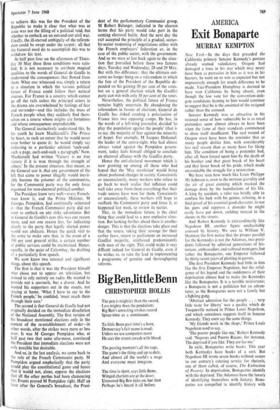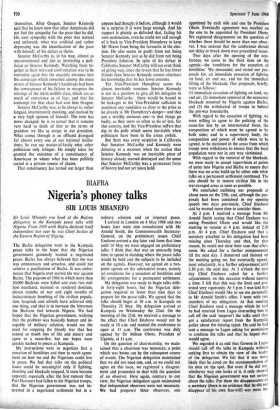Exit Bonaparte
AMERICA MURRAY KEMPTON
New York—In the days that preceded the California primary Senator Kennedy's posture already seemed valedictory. Oregon had damaged a trust in his star which may never have been as pervasive in him as it was in his bearers; he went on to win as expected but not impressively enough for much difference to be made. Vice-President Humphrey is deemed to have won California by being absent, even though the low vote for the convention-dele- gate candidates leaning to him would continue to suggest that he is the anointed of the resigned rather than the aroused.
Senator Kennedy was as attractive in his restored sense of how vulnerable he is as royal pretenders seem almost always to have been when the fame of their standards commenced to show itself insufficient. The real wound of Oregon must have been the reminder that so many people dislike him, with considerably less real reason than as many have for liking him. The condition of being a pretender had, after all, been forced upon him by the death of his brother and that great break of his heart and that lesser break of his pride, which made unavoidable the struggle for a restoration.
We have seen how much like Louis Philippe Mr Johnson is, even to the nervous garrulity and the air of great cunning which masked the damage done by the humiliations of his life. A king by accident, a ruler too briefly able to confuse his luck with his genius, refusing, in a final proof of his essential good character, to use his guns and suppress a disorder he might easily have put down, yielding instead to the shouts in the streets.
And Robert Kennedy is extraordinarily like Napoleon III, another figure uncharitably assessed by history. We owe to William V. Shannon the first notice that the proper parallel for the Kennedys is not the Adamses, two presi- dents followed by admired generations of his- torians, ambassadors and railroad managers, but rather the Bonapartes, one Emperor followed by thirty-seven years of plotting in garrets.
The first President Kennedy had little in him like the first Emperor Napoleon, but the reful- gence of his legend and the suddenness of their deprivation almost had to make the Kennedys like the Bonapartes. It is a terrible misfortune; a Bonaparte is not a politician but an adven- turer, as the Bonapartes were not a family but a fighting gang.
'Abstract adoration for the people . . . very little taste for liberty' was a quality which de Tocqueville noticed in Prince Louis Napoleon, and which sometimes suggests itself in Senator Kennedy. They even say the same things.
'My friends work in the shops,' Prince Louis Napoleon used to say.
`The poorer people like me,' Robert Kennedy said. 'Negroes and Puerto Ricans, for instance. The deprived if you like. They are for me.'
In exile, Bonapartes write books. This year both Kennedys have books of a sort. But Napoleon III wrote seven books without access to our century's catering service for rhetoric, one of them called, of course, The Extinction of Poverty. In deprivation, Bonapartes identify with the deprived. The Adamses have the luxury of identifying themselves with history; Bona- partes are compelled to identify history with
themselves. After Oregon, Senator Kennedy said that he knew now that other Americans did not feel the sympathy for the poor that he did. His own sympathy with the poor was natural and unforced; what was artificial and rather depressing was the identification of the poor with himself, of his defeat as theirs.
Senator McCarthy is, in his way, almost as unconventional and just as interesting a poli- tician as Senator Kennedy. Watching them to- gether in their televised confrontation was to be reminded again that the ungainly entrance into the campaign which remained among the more severe of Senator Kennedy's handicaps had been the consequence of his failure to recognise the stirrings of the white middle class, which are as much of conscience as of fear, and that his contempt for that class had cost him Oregon.
Senator McCarthy was, as he always is, rather languid, intermittently mocking, and marked by a very high opinion of himself. The tone has never changed; he is so casual that it remains very hard to think of him in the terms of grandeur we like to assign to our president. What comes through is an offhand disregard for almost every one of our national institu- tions; he can say matter-of-factly what other politicians only whisper. He simply takes for granted the existence of a constituency of Americans to whom what has been publicly sacred is a private source of shame.
That constituency has turned out larger than anyone had thought it before, although it would be a surprise if it were large enough. And his support is plainly so defected that, failing his own nomination, even he could not call enough of it back to Vice-President Humphrey to keep Mr Nixon from being the favourite in the elec- tion. He also seems to profit from not being Senator Kennedy just as he did from not being President Johnson. In spite of his defeat in California Senator McCarthy will not even think of giving way, since the lesson that he has fewer friends than Senator Kennedy cannot eliminate his knowledge that he has fewer enemies.
Yet Vice-President Humphrey seems the almost inevitable nominee. Senator Kennedy is not in a position to give all his delegates to Senator McCarthy : there would be bound to be leakages to the Vice-President sufficient to nominate any candidate as close to the prize as he already is. Mr Humphrey's danger—and that not a terribly ominous one—is that things go badly, as they seem so often to do of late, for this country, and the Vice-President suffers that dip in the polls which seems inevitable when politicians have been in the arena awhile.
But there was every suspicion in California that Senators McCarthy and Kennedy were debating at a moment when the notion that Senator Kennedy was an inevitable piece of history already seemed destroyed and the sense that Senator McCarthy was a permanent force of history had not yet taken hold.







































 Previous page
Previous page